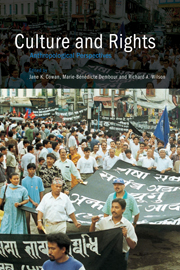Book contents
- Frontmatter
- Contents
- List of contributors
- Preface
- 1 Introduction
- Part I Setting universal rights
- Part II Claiming cultural rights
- 7 Ambiguities of an emancipatory discourse: the making of a Macedonian minority in Greece
- 8 From group rights to individual rights and back: Nepalese struggles over culture and equality
- 9 Advancing indigenous claims through the law: reflections on the Guatemalan peace process
- 10 Rights as the reward for simulated cultural sameness: the Innu in the Canadian colonial context
- Index
7 - Ambiguities of an emancipatory discourse: the making of a Macedonian minority in Greece
Published online by Cambridge University Press: 05 June 2012
- Frontmatter
- Contents
- List of contributors
- Preface
- 1 Introduction
- Part I Setting universal rights
- Part II Claiming cultural rights
- 7 Ambiguities of an emancipatory discourse: the making of a Macedonian minority in Greece
- 8 From group rights to individual rights and back: Nepalese struggles over culture and equality
- 9 Advancing indigenous claims through the law: reflections on the Guatemalan peace process
- 10 Rights as the reward for simulated cultural sameness: the Innu in the Canadian colonial context
- Index
Summary
Introduction
In 1991, in the wake of Yugoslavia's violent disintegration, the Federal Republic of Macedonia bid to establish itself as an independent state. It sought international recognition under the name Macedonia. On its flag it placed a sixteen-pointed symbol – identified as a star south of the border, and a sun north of it – drawn from archeological finds in a recently excavated ancient tomb claimed as that of Phillip of Macedon in the Greek village of Vergina. These actions were read by many Greeks as a ‘theft of history’ and tantamount to territorial claims upon the portion of Macedonia incorporated into Greece in 1912–13. Greek reaction was swift and intense. Shop receipts, telephone cards, bill boards and graffiti proclaimed ‘Macedonia is one and it is Greek’. On St Valentine's Day 1992, Greeks in their thousands poured into Salonika to demonstrate support for this claim. The ‘Macedonian Question’, dormant since the close of the Second World War, was reawakened.
The tumult of these mass demonstrations and of Greek diplomatic manoeuvres within the European Union over the name obscured another dimension to the controversy. It concerned the revival of the never fully resolved controversy within Greece over the existence within her borders of a distinctive Slavic Macedonian people. As early as the mid-1980s, self-defined Macedonian activists had come into conflict with police and local authorities when they sang songs in Macedonian and used Macedonian terms for dances and for local place names during village festivals (Danforth 1995: 121).
- Type
- Chapter
- Information
- Culture and RightsAnthropological Perspectives, pp. 152 - 176Publisher: Cambridge University PressPrint publication year: 2001
- 27
- Cited by



